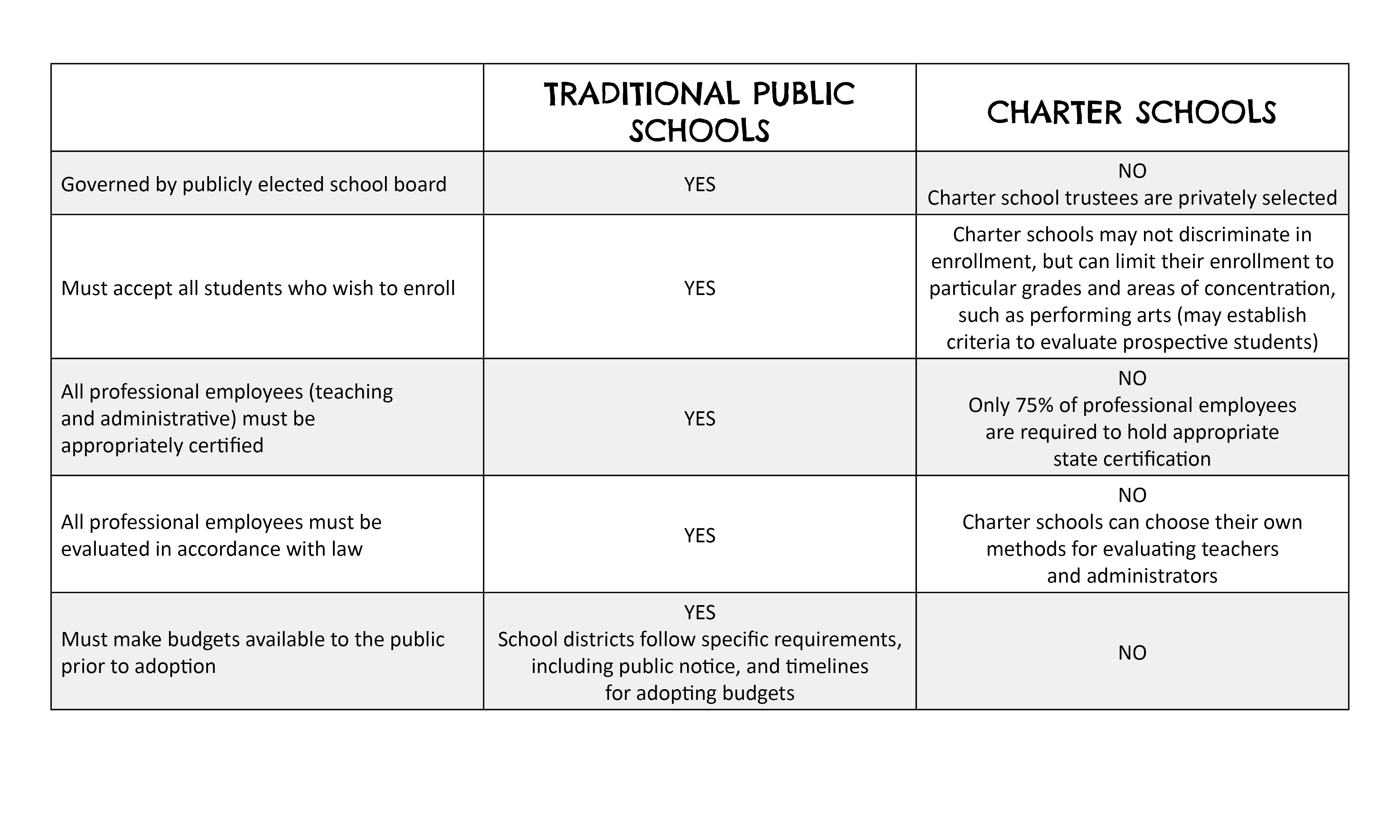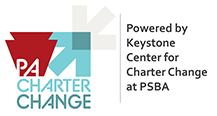In order to understand why charter schools have such a profound impact on public education funding in Pennsylvania, the first step is to learn more about charter schools and how they work. Explore the questions below for background information on charter schools and how they operate.
Charter schools are public schools that are authorized to operate independently from traditional public schools.
According to the Charter School Law, charter schools were created to:
- Improve student learning;
- Increase educational opportunities for students;
- Encourage the use of different and innovative teaching methods;
- Create new professional opportunities for teachers; and
- Provide expanded choices within the public school system.
To give charter schools the independence to achieve these purposes, charter schools are exempt from many of the mandates governing traditional public schools. See “How are charter schools different from traditional public schools?” below for more information on these exemptions.
There are two general types of charter schools operating in Pennsylvania – brick-and-mortar charter schools and cyber charter schools. The two types of charter schools differ in terms of how they are authorized and the method of instruction used.

*This includes regional charter schools which are authorized by more than one local school board.
A charter school may be established by an individual; any nonsectarian college or university located in PA; or any nonprofit, nonsectarian corporation, association or partnership.
Pennsylvania’s Charter School Law was adopted in 1997 to authorize the creation of brick-and-mortar charter schools. The law was amended in 2002 to authorize the creation of cyber charter schools.
Since the Charter School Law was enacted, no substantial updates have been made to address the significant issues that school districts, charter schools, parents, policymakers, and taxpayers have encountered in the 25 years since enactment.
There were 165 brick-and-mortar charter schools and 14 cyber charter schools operating in Pennsylvania during the 2022-23 school year educating nearly 162,000 students.
The map below shows:
- The location of each brick-and-mortar charter school.
- School district boundaries.
- County boundaries.
Turn filters on or off and zoom in for more detail. For example, to see information at the county level, ensure the school district filters are turned off.
School districts are required by law to make a tuition payment to a charter school or cyber charter school for every student residing in the school district, who enrolls in the charter school or cyber charter school. In 2021-22, nearly 92% of charter school funding (from state, local and federal sources) came from mandatory tuition payments from school districts.
Although charter schools are considered public schools, they are exempt from many of the state’s statutory and regulatory mandates required for traditional public school systems. These exemptions include:

For a more complete list of the differences between charter school and traditional public schools, see the complete comparison.
Charter schools are governed by privately managed boards of trustees that vary in number and who may set their own rules of operation. Charter trustees may have little or no connection to or accountability to the taxpayers in the communities whose students they serve and may sit on multiple charter boards.
Some charter schools are managed by employees directly appointed and supervised by the board of trustees. However, many charter school boards outsource all aspects of charter school’s management and operation to an education management organization (EMO).
EMOs are for-profit corporations that, for all intents and purposes, operate the charter school. A typical arrangement is that the EMO accepts the per student tuition payment as compensation for its services. If the EMO can operate at a lower cost, the difference is profit for the EMO.
In some cases, a for-profit EMO can help create the nonprofit organization, which applies for and opens a charter school. Then, that charter school contracts with the EMO to provide services to the school.
While charter schools must be established as nonprofit entities, contracting with an EMO allows a for-profit entity to operate in the background and outside of public view. Because an EMO is not subject to public transparency and accountability laws, taxpayers are unable to know how public money is being spent.
For-profit EMOs operate in numerous states. The Washington Post recently posted a story about how a few of these EMOs operate in Pennsylvania.
The Charter School Appeal Board (CAB) has the exclusive review of a decision by a local school board to deny a charter application and of a decision by a local school board to not renew or revoke a charter. CAB also has the exclusive review of a decision by the Pennsylvania Department of Education (PDE) to deny a cyber charter application and of a decision by PDE to not renew or revoke a cyber charter.
In addition, CAB has the exclusive review of a direct appeal filed by a charter applicant when the local school board fails to hold a public hearing or timely act on a charter application and of a direct appeal filed by a cyber charter applicant when PDE fails to hold a public hearing or timely act on a cyber charter application.
Who serves on the Charter School Appeal Board?
The CAB consists of the Secretary of Education and six members who are appointed by the Governor with the consent of a majority of all the Senate members. The members include a parent of a school-aged child, a school board member, a certified teacher actively employed in a public school, a faculty member or administrative employee of a higher education institution, a member of the business community, and a member of the State Board of Education. PDE provides assistance and staffing, and the Governor’s General Counsel provides legal advice and assistance to CAB.
